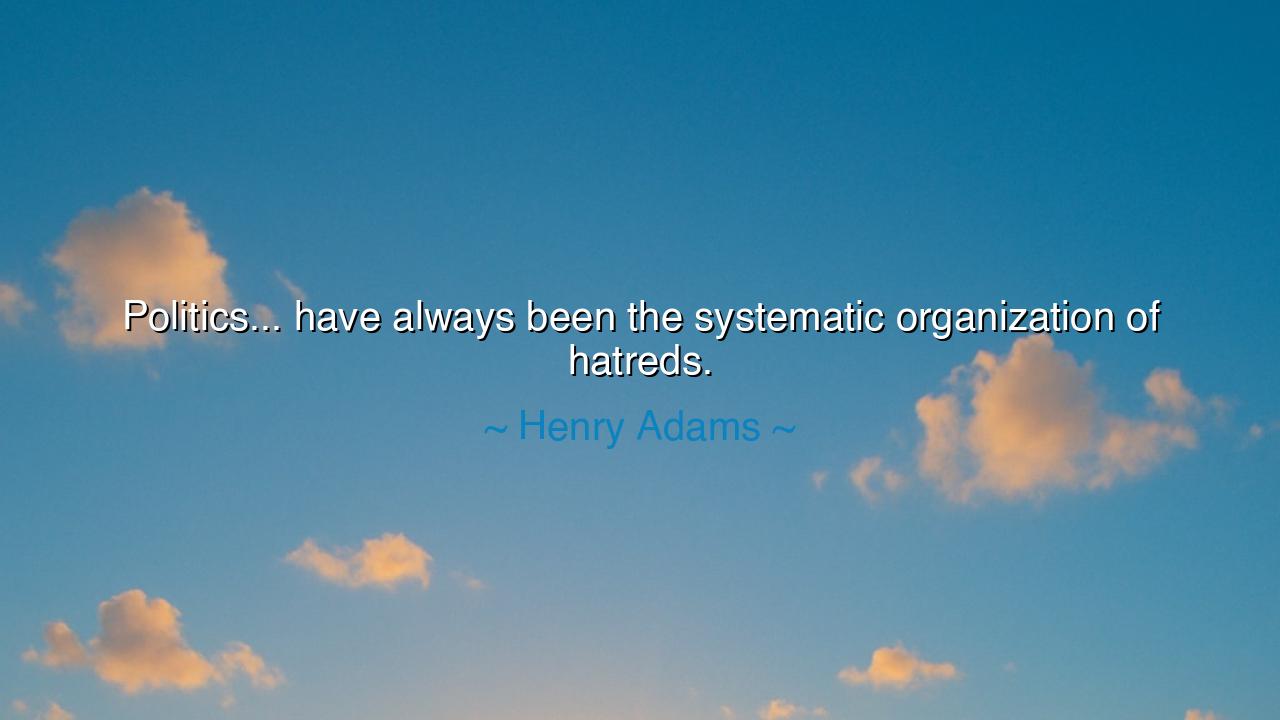
Politics... have always been the systematic organization of






The words of Henry Adams — “Politics… have always been the systematic organization of hatreds” — cut like a blade through the illusions of noble rhetoric. For he declares what many fear to admit: that beneath the banners, the speeches, and the laws, politics often thrives on the division of peoples, the stirring of passions, and the careful shaping of hatreds into order. It is not chaos, but a grim design, where rulers harness enmity as a craftsman harnesses fire — dangerous, destructive, yet immensely powerful.
From the earliest days, leaders have known that nothing binds men together more swiftly than a common foe. The organization of hatreds is the dark art of forging unity not through love, but through opposition. Empires rise not only by inspiring loyalty, but by defining enemies within and without. Thus, Adams reminds us that politics, at its most primal, is not about justice or virtue, but about channeling human passions into structures that sustain power.
History gives us a stark witness in the story of the French Revolution. What began as a cry for liberty soon spiraled into the Reign of Terror, where faction turned upon faction, and the revolution consumed its own children. Robespierre and his allies perfected the systematic organization of hatreds, defining enemies at every turn, until suspicion and fear were the only laws that remained. The guillotine became the instrument not merely of justice, but of political survival, proving Adams’ words with rivers of blood.
Yet even in modern times, this truth endures. Nations rally their citizens not only by promises of prosperity, but by painting vivid portraits of adversaries — foreign powers, rival ideologies, or internal groups deemed threats to order. Such organization provides clarity, purpose, and cohesion, but it comes at a cost: the narrowing of vision, the loss of compassion, and the elevation of hatred to the status of law.
O seekers of wisdom, do not mistake Adams’ words for cynicism alone, but as a warning carved in iron. If politics is forever bound to hatred, then the duty of the wise is to unbind it, to seek paths where unity is forged by shared humanity rather than common enemies. But remember always: to ignore the power of hatred is folly, for it has shaped nations as surely as love has. The ancient task of leaders, therefore, is not to deny this force, but to master it, lest it consume both ruler and people alike.






LHLamgi Hoi
When Henry Adams says politics is about ‘hatreds,’ it makes me wonder whether this is just the nature of power dynamics. Is it possible for political systems to be free from the influence of hatred, or do we need some level of division to mobilize people? If politics is organized around this conflict, how can we ensure that it doesn't descend into destructive polarization? Can we ever envision a political world built on mutual respect instead of rivalry?
TKNguyen Trong Khiem
Adams’ quote on politics being about organizing hatred seems like a harsh critique of human nature and governance. Could it be that he's highlighting the power struggles that often characterize political systems, where opposing views are seen as threats rather than opportunities for growth? How much of politics today still operates in this way, and how can we shift the focus to more positive and productive forms of political engagement?
UGUser Google
I get the sense that Henry Adams is describing politics as a form of manipulation, where conflict is deliberately stoked to keep power structures in place. But isn’t that a bit too pessimistic? While it’s undeniable that politics can divide, aren't there examples where political movements have been driven by love, justice, and the desire for unity? How do we change the narrative around politics to focus more on reconciliation and common ground instead of hatred?
KCkhai cun
This quote from Henry Adams gives a rather bleak view of politics. It suggests that politics feeds on division, but is that the only way to look at it? Do we not also see politics as a platform for progress, cooperation, and change? What role do compromise and unity play in political systems, especially when we're constantly confronted with the darker, divisive aspects of politics? Is there a way to balance these forces?
DMAnh Do Minh
Henry Adams' statement on politics being the ‘systematic organization of hatreds’ feels incredibly cynical, but is there some truth in it? Politics often seems to thrive on division, pitting groups against each other. But is it possible to view politics purely in this way, or can politics also be about bringing people together for the common good? Can it really be reduced to just organizing hatred, or does it serve a more complex purpose?